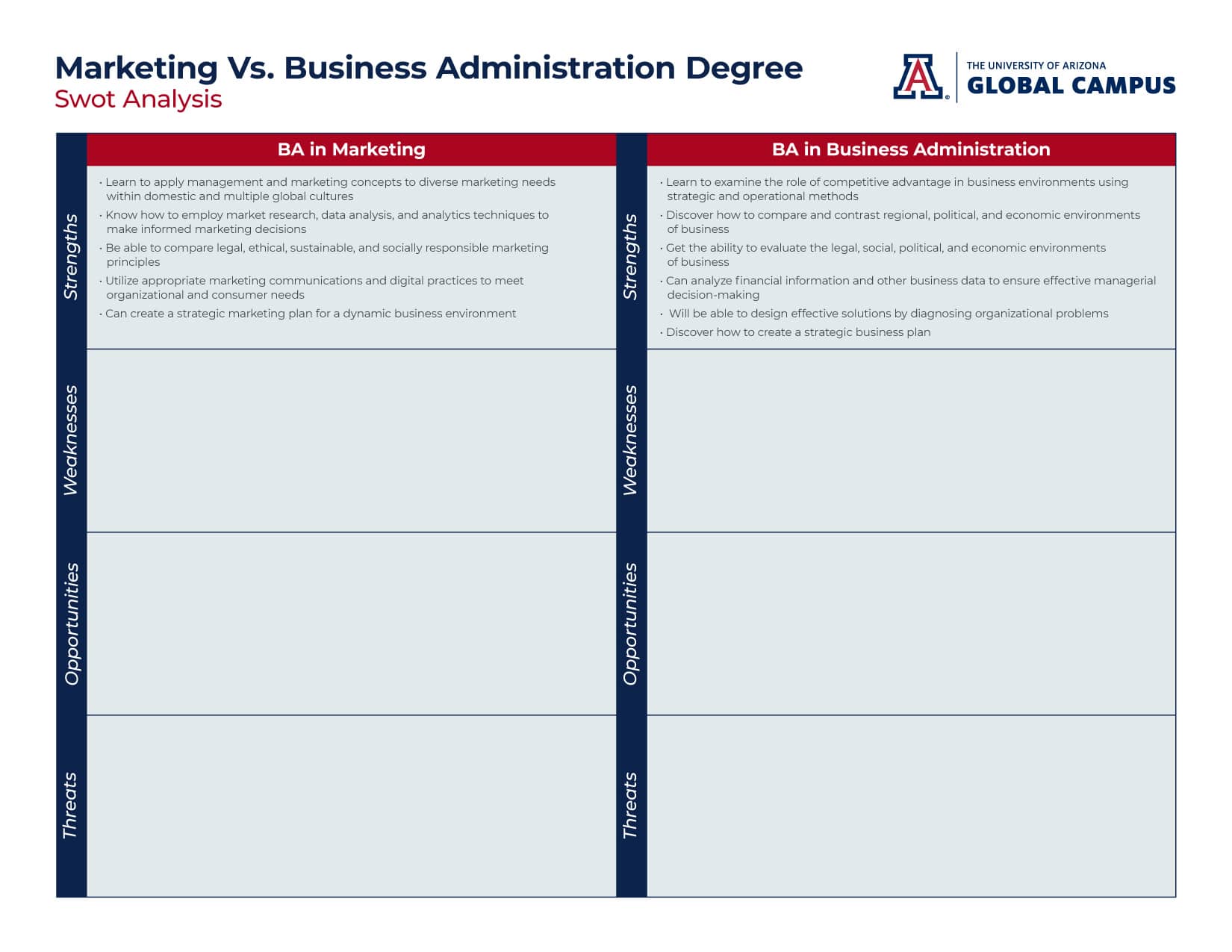Business degrees continue to be the most popular major for bachelor’s degrees. But there are a variety of different business degrees available. Two popular degrees in this area of focus are business administration and marketing.
To help you determine which area of study you may want to pursue, we will focus on the similarities and differences between a marketing and business administration degree—two popular subjects that are offered by many colleges.

What is a Business Administration Degree?
A bachelor’s degree in business administration is the more comprehensive of the two degrees, focusing on building a set of professional skills that students will be able to use throughout their career in a variety of industries and situations. Key areas of study include project management, critical thinking, and leadership.
Students working toward a business administration degree will learn skills that will allow them to:
- Evaluate the business environment in which a company operates
- Conduct competitive analysis
- Analyze the financial health of a company
- Create strategic business plans
Due to the broader focus of a general business administration degree, graduates have the working knowledge to enter a variety of business environments. According to the National Center for Education Statistics, business administration remains one of the most popular college majors in the United States–and has been since 2012. However, business administration degrees often also allow for students to choose a specialization, giving them additional insights into a particular field of business, and potentially a competitive edge based on their career goals. Typical specializations include finance, marketing, entrepreneurship, and project management.
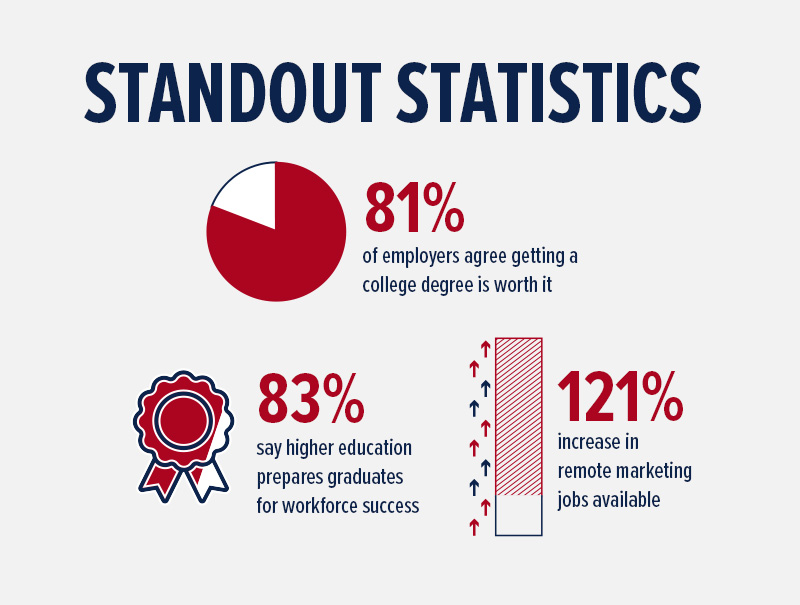
Business Administration Careers
With a broad foundation of business knowledge and expertise in analyzing a market, a business administration degree can lead students to pursue potential career opportunities in both the private and public business sectors, government positions, or the option to start a personal business.
In fact, in a recent Forbes article, 81% of employers stated they agree that getting a college degree is worth it, and 83% said “higher education is preparing graduates to succeed in the workforce.” Additional job options may be found in investment banking, small business management, or by completing a master’s degree.
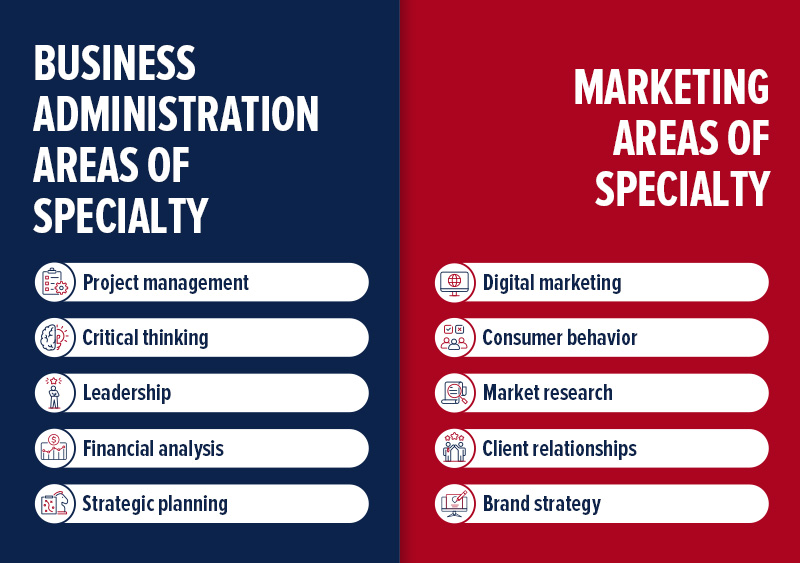
Business Degree vs. Marketing Degree for Running a Business
While a degree in business is not a prerequisite to running your own business, Business News Daily advises that it provides a strong foundation for the many elements you can expect in starting and managing a business day in and day out. The full report, summarized below:
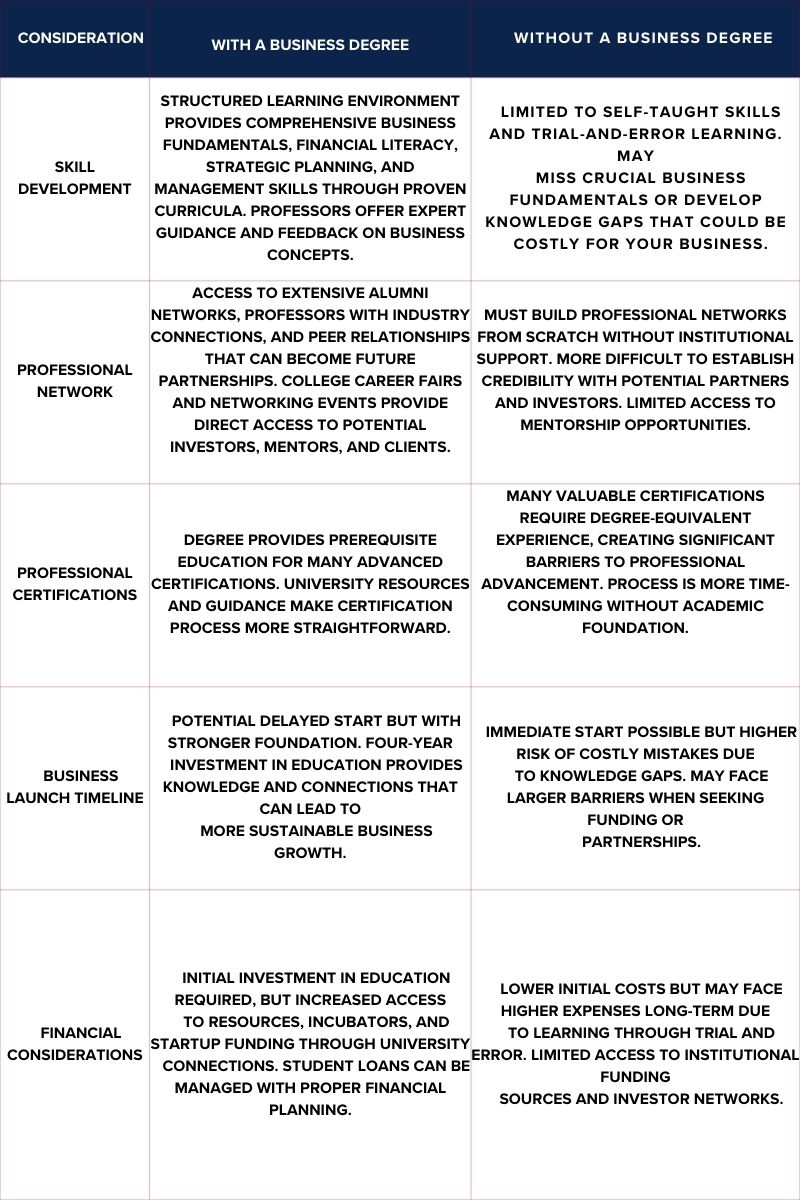
What Skills Can You Gain from a Business Administration Degree?
With the versatility of a business administration degree, you’ll similarly gain a versatile set of skills. Here’s a look at the top 10 skills you might expect to hone in the process of earning your business administration degree:
- Communication
- Customer service
- Digital intelligence
- Multitasking
- Leadership
- Organization
- Research
- Time management
- Teamwork
- Money management
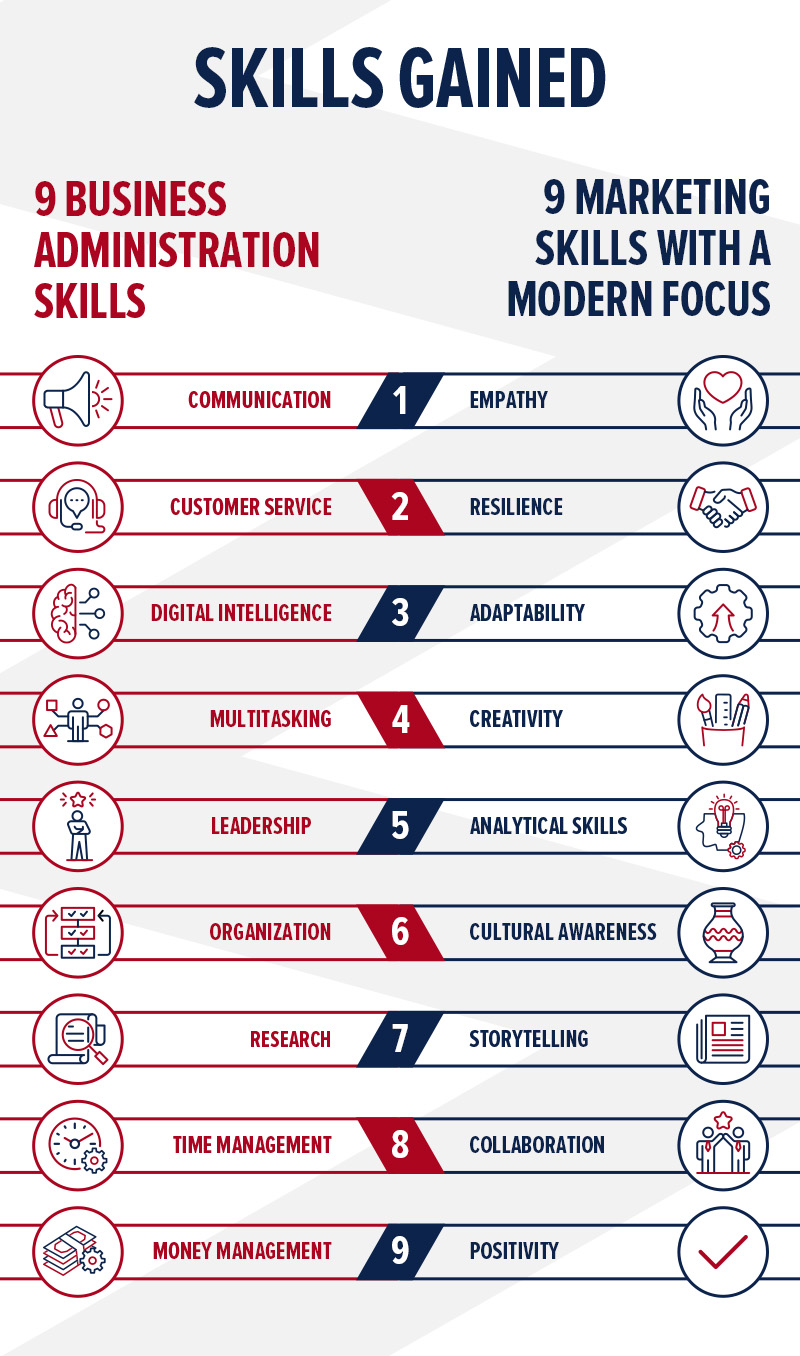
What is a Marketing Degree?
Since it is often categorized within the business department of colleges, understanding how a degree in marketing differs from a business administration degree can feel confusing. Basically, a marketing degree focuses on one area of business study throughout the course load, allowing those students who know the particular field they want to enter the opportunity to hone in on skills that interest them.
In addition to learning some of the basic business topics like accounting, economics, and management, a marketing degree will extend a student’s understanding of how to close the gap between a business and its potential customers. Beyond focusing on just the internal operations of a business, a marketing degree aims to provide students with the skills needed to help build and maintain relationships with clients.
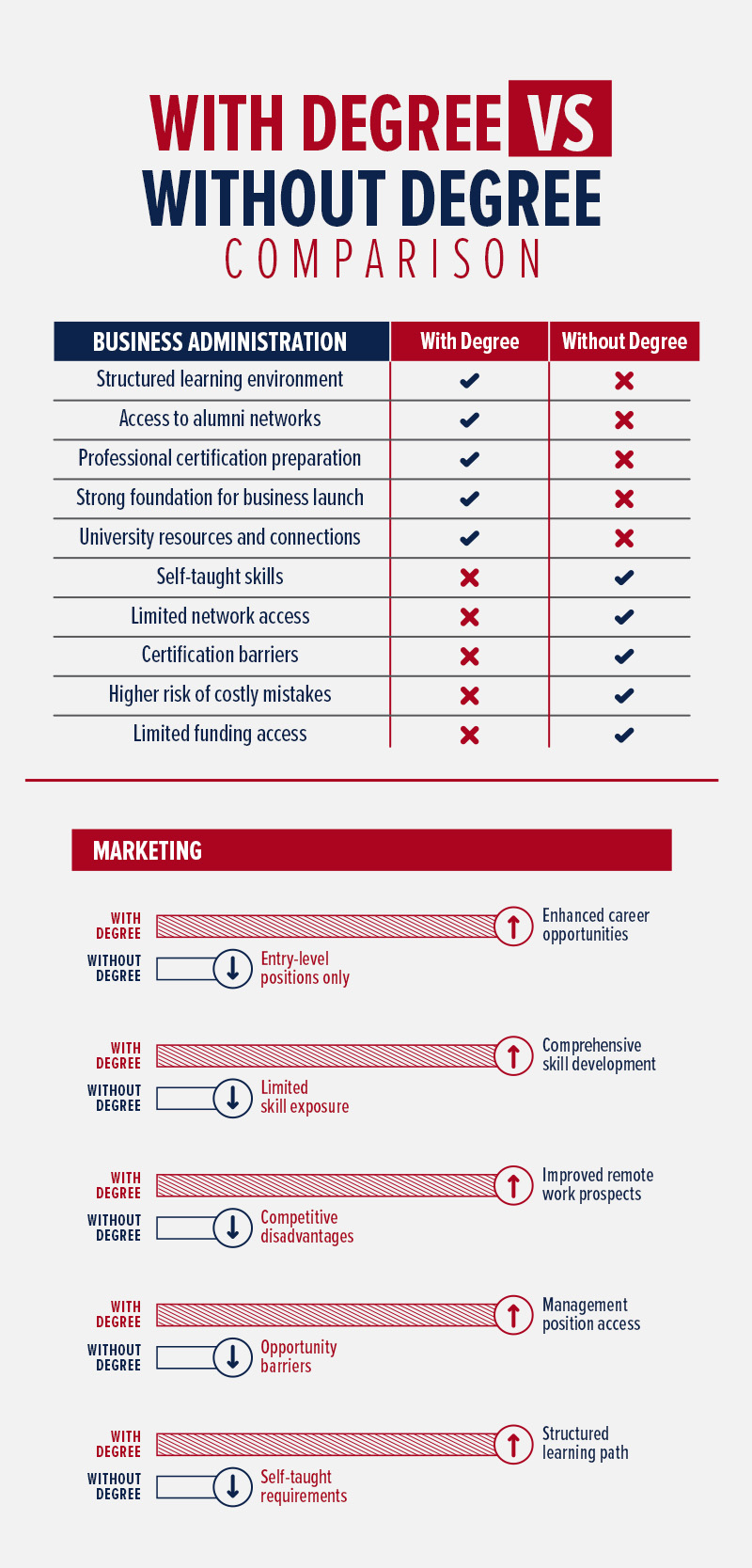
What Skills Can You Gain from a Marketing Degree?
Marketing degree programs equip students with a powerful combination of analytical and creative skills that are increasingly valuable in today's digital economy. According to the American Marketing Association (AMA), the majority of marketing programs now include data analytics and digital marketing components, reflecting industry demands for quantitative decision-making abilities. Students develop expertise in market research and consumer behavior analysis, with McKinsey reporting that these research skills are among some of the most sought-after skills in a world that’s quickly becoming dominated by AI, robotics, and other automation. The full list of top skills for marketers to thrive, per McKinsey, is as follows:
- Add value beyond what can be done by automated systems and intelligent machines
- Operate in a digital environment
- Continually adapt to new ways of working and new occupations
The Digital Marketing Institute emphasizes that modern marketing curricula teach practical skills in search engine optimization (SEO), social media strategy, and content marketing - competencies that many employers now consider essential. Beyond technical abilities, marketing programs cultivate critical soft skills that machines cannot replicate. Nine soft skills marketing degree graduates might expect to glean from the program include:
- Empathy
- Resilience
- Adaptability
- Creativity
- Analytical Skills
- Cultural Awareness & Inclusivity
- Storytelling
- Collaboration
- Positivity

Marketing Careers
Since marketing degrees are often considered a part of the overall study of business, graduates with a bachelor’s in marketing often also have career opportunities in a variety of different public and private sector businesses, including, but not limited to, positions such as:
- Digital Marketing Strategist
- Social Media Strategist
- Market Research Analyst
- Communications Specialist
- Sales Representatives
- Wholesale and Manufacturing (Except Technical and Scientific Products)
For more information on careers in this occupational field, please visit the U.S. Bureau of Labor Statistics website.
Do You Need a Marketing Degree to Work in Marketing?
While it's possible to work in marketing without a degree, the data shows that formal education provides significant advantages in terms of career growth, flexibility, and job opportunities. Take a look at the table below, which summarizes Coursera’s recent findings on marketers in the workplace.
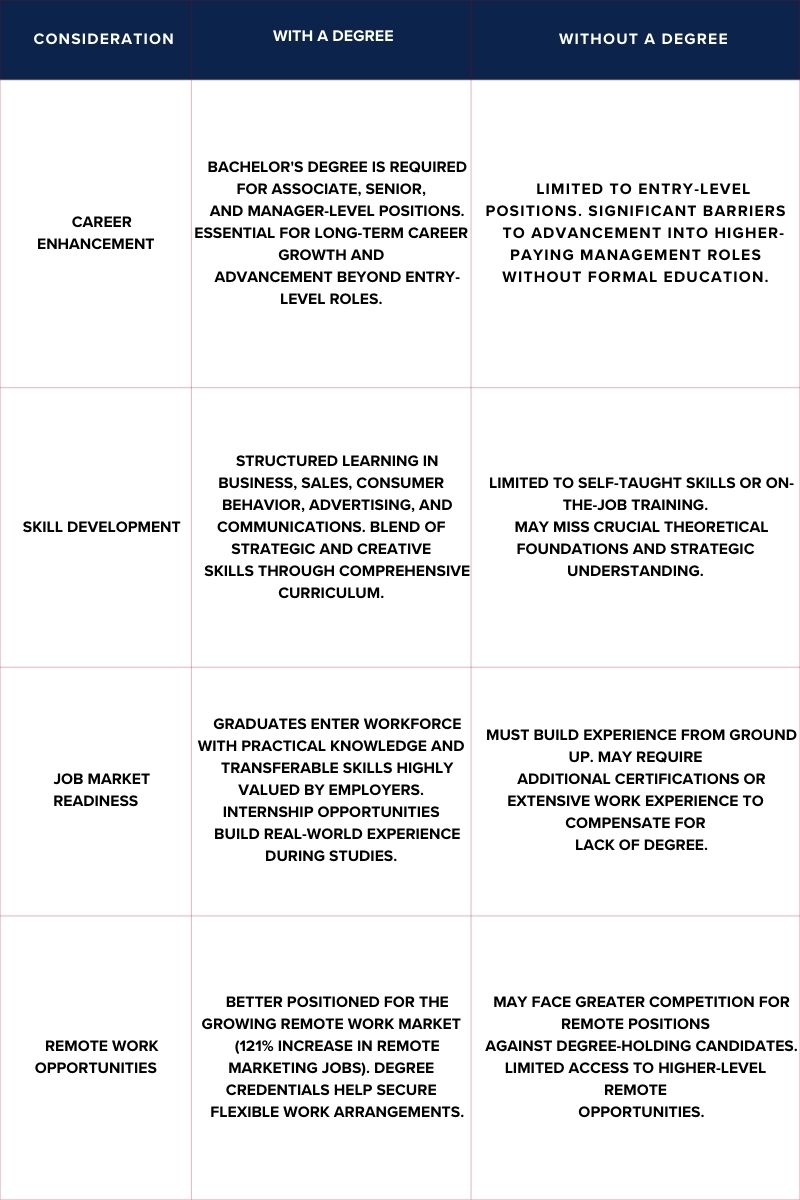
BA in Business Administration or BA in Marketing?
If you’re still not sure which degree is right for you, try conducting a SWOT analysis of your options. A strategic analysis tool, a SWOT analysis is a common way companies and businesses review a business situation. An acronym for Strengths, Weaknesses, Opportunities, and Threats, a SWOT analysis can help you clearly lay out the pros and cons of a situation, leading to a more informed decision.
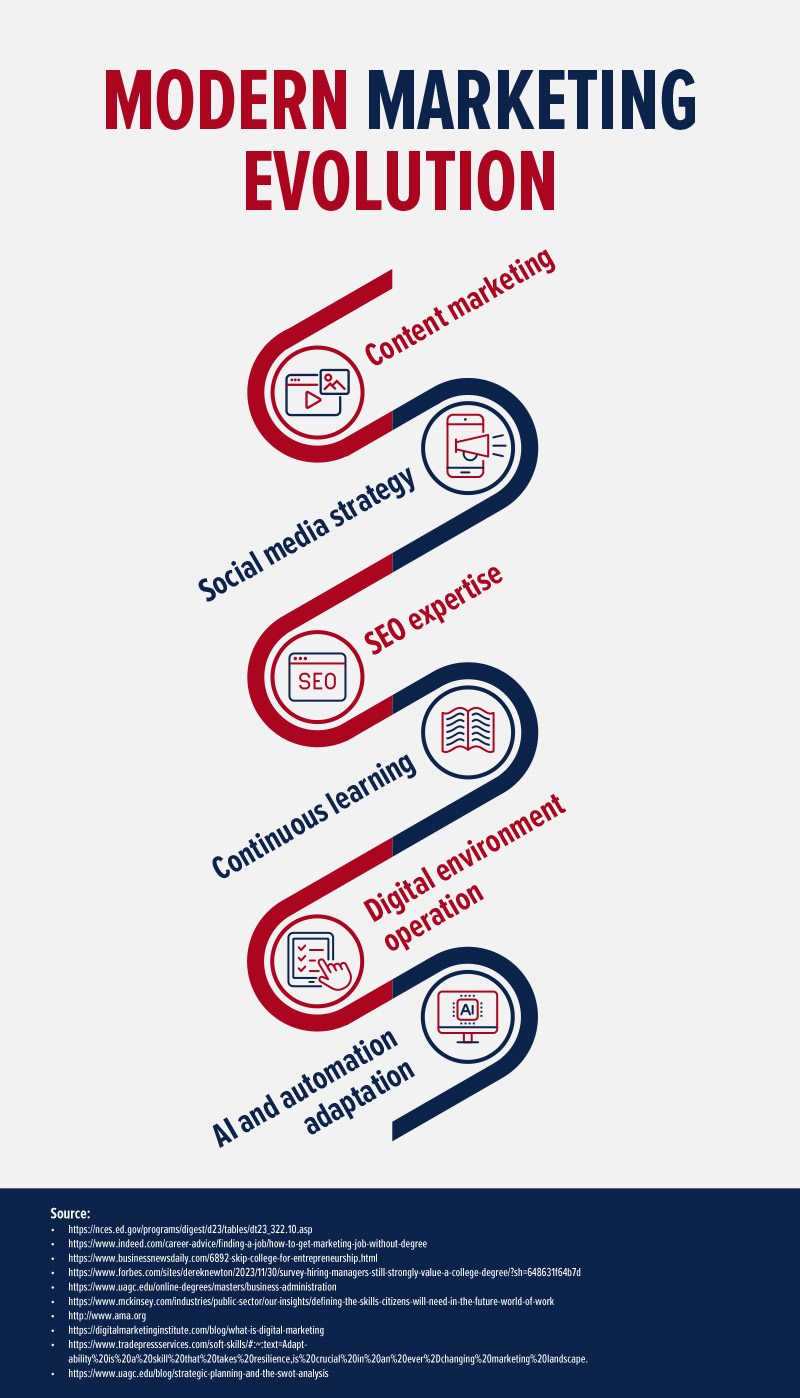
Internal Origin Inputs
These are inputs that are directly related to the degree you are analyzing and your personal traits. Items listed may relate to the potential alignment with your personal interests or ability to apply for a job you desire.
- Strengths
Weaknesses
External Origin Inputs
Opportunities and threats are items that will come from sources you cannot directly control. These may relate to incidents in an industry or changes in the economic outlook.
- Opportunities
- Threats
If you’re ready to give it a try, click the image below to download and print our SWOT worksheet.
View the Full Marketing vs. Business Administration Infographic


